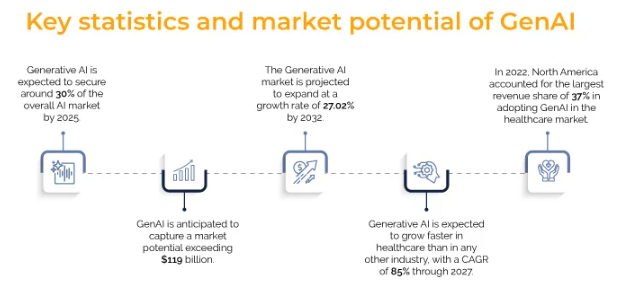Benefits of Generative AI in Healthcare: Revolutionizing Patient Care and Medical Innovation

Generative AI, a subset of artificial intelligence, is making significant strides in healthcare by creating new possibilities for improving patient outcomes, optimizing operations, and advancing medical research. By leveraging large datasets and sophisticated algorithms, generative AI can generate new content, automate tasks, and provide insights that were previously unimaginable. In this article, we explore the numerous benefits of generative AI in healthcare and how it is transforming the industry.
What is Generative AI in Healthcare?
Generative AI refers to machine learning models that can create new data, content, or solutions by learning patterns from existing datasets. Unlike traditional AI, which often focuses on prediction and classification, generative AI can generate new and useful outputs—whether in the form of images, text, or even drug compounds—based on its learned understanding.
In healthcare, generative AI can be used to develop new medical treatments, design personalized healthcare plans, analyze medical images, automate administrative tasks, and enhance patient care. The potential applications are vast and transformative, touching every aspect of the healthcare ecosystem.
Key Benefits of Generative AI in Healthcare
1. Accelerating Drug Discovery and Development
One of the most exciting applications of generative AI in healthcare is its ability to accelerate the drug discovery process. Traditionally, developing a new drug can take years, involving extensive trial and error. Generative AI can analyze vast datasets of chemical compounds and predict the properties of new molecules, significantly reducing the time and cost involved in discovering new drugs.
Key Benefits:
- Faster Drug Development: By predicting which molecules are likely to be effective, AI can expedite the screening process.
- Cost Reduction: Reduces the costs associated with manual research and testing.
- Personalized Medicine: AI can also help identify the best treatments for specific patient profiles, paving the way for more personalized healthcare solutions.
Real-World Use Case: BenevolentAI, a company specializing in AI-driven drug discovery, utilized generative AI to identify a potential drug candidate for ALS (Amyotrophic Lateral Sclerosis), which traditionally took years of research. This accelerated the timeline from years to just a few months.
2. Enhancing Diagnostic Accuracy
Generative AI plays a critical role in improving diagnostic accuracy, particularly in medical imaging. AI-powered tools can analyze medical scans, such as X-rays, MRIs, and CT scans, to identify anomalies that may be missed by human doctors. Moreover, generative AI can help create synthetic medical images to augment training datasets, improving the capabilities of diagnostic algorithms.
Key Benefits:
- Increased Precision: AI can detect early signs of diseases such as cancer, heart conditions, or neurological disorders.
- Augmented Training Data: Generative AI can create synthetic images that are used to train other AI models, enhancing their ability to identify rare or complex conditions.
- Faster Diagnoses: AI can assist healthcare professionals in delivering diagnoses more quickly, enabling faster intervention and better outcomes.
Real-World Use Case: PathAI, a company that uses generative AI for pathology, has developed algorithms that assist pathologists in diagnosing diseases such as cancer with greater accuracy. Their AI tool has been shown to significantly improve diagnostic precision compared to traditional methods.
3. Personalized Treatment Plans
Generative AI is transforming the way healthcare providers create treatment plans. By analyzing patient data, including genetics, lifestyle factors, and medical history, AI can generate personalized treatment options that are tailored to the individual’s unique needs. This can improve treatment efficacy and reduce the trial-and-error approach often seen in healthcare.
Key Benefits:
- Optimized Treatment: AI-generated plans consider a broad range of data, leading to more accurate and effective treatments.
- Patient-Centric Care: Personalized plans increase patient satisfaction by providing tailored treatments.
- Minimized Side Effects: By predicting how a patient will respond to different medications, AI can reduce adverse reactions.
Real-World Use Case: IBM Watson for Oncology, developed by IBM, uses AI to analyze large datasets of medical records and research literature to generate personalized cancer treatment options. It has already helped oncologists in hospitals like Memorial Sloan Kettering Cancer Center deliver more personalized care.
4. Streamlining Administrative Tasks
Generative AI can significantly reduce the administrative burden on healthcare workers by automating routine tasks. Tasks such as billing, scheduling, and patient records management often consume significant time and resources. AI-driven automation can handle these tasks more efficiently, freeing up healthcare professionals to focus on patient care.
Key Benefits:
- Improved Efficiency: AI can automate administrative processes like medical billing, data entry, and scheduling.
- Cost Savings: By reducing the need for manual labor, hospitals can lower operational costs.
- Reduced Errors: AI can minimize human errors in administrative work, improving accuracy and reducing costly mistakes.
Real-World Use Case: One example is Olive AI, a platform that uses AI to automate administrative tasks in hospitals. By automating back-office operations, Olive AI has helped hospitals save time and costs, allowing staff to focus more on direct patient care.
5. Optimizing Resource Allocation
Generative AI can also assist healthcare organizations in optimizing resource allocation. By analyzing patient data and predicting healthcare demands, AI can help hospitals and clinics manage staffing, medical supplies, and equipment usage more efficiently. This leads to better patient outcomes and reduced operational waste.
Key Benefits:
- Better Resource Management: AI can predict high-demand periods and ensure that staff and resources are optimally distributed.
- Reduced Waste: By optimizing the use of resources like medical supplies and equipment, AI helps reduce waste.
- Cost Efficiency: Healthcare providers can allocate resources more effectively, leading to significant cost savings.
Real-World Use Case: CureMetrix, a company specializing in AI-driven mammogram analysis, helps radiologists by predicting potential workload surges, which aids in better resource management within imaging centers. This ensures that healthcare providers are prepared for peak demand times, improving operational efficiency.
People Also Ask
1. How does generative AI help in drug discovery?
Generative AI helps in drug discovery by analyzing vast datasets of chemical compounds and predicting the properties of new molecules. This speeds up the identification of promising drug candidates and reduces the need for traditional trial-and-error methods, cutting down the time and cost of drug development.
2. What are the advantages of generative AI in diagnostics?
Generative AI enhances diagnostic accuracy by analyzing medical images and identifying potential issues that may be missed by human doctors. It can also create synthetic medical images to augment training datasets, improving the AI model’s ability to detect rare or complex conditions, leading to faster and more accurate diagnoses.
3. Can generative AI improve patient treatment plans?
Yes, generative AI can analyze a patient’s medical history, genetics, and lifestyle factors to create personalized treatment plans. This tailored approach ensures more accurate treatments and reduces the trial-and-error process, improving overall patient care and minimizing side effects.
Conclusion: The Future of Generative AI in Healthcare
Generative AI is transforming healthcare by improving diagnostic accuracy, accelerating drug discovery, personalizing treatment plans, and streamlining administrative tasks. As the technology continues to evolve, its impact will become even more profound, driving greater efficiencies, reducing costs, and improving patient outcomes. The future of healthcare lies in harnessing the power of generative AI to create a more patient-centric, data-driven, and efficient healthcare system. As adoption increases, we can expect AI to play a pivotal role in revolutionizing medical care for years to come.



